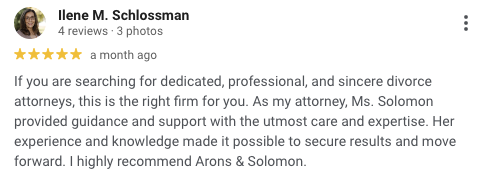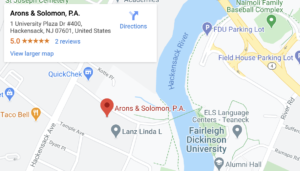Bergen County Mediation Lawyer

Are you dealing with a divorce? The Bergen County mediation lawyers at Arons & Solomon Divorce Lawyers know that families do not always wish to go to court to settle their divorce cases. Contact us at (201) 487-1199, we help families in Northern New Jersey and Bergen County with arbitration and mediation.
The family law and divorce lawyers at Arons & Solomon Divorce Lawyers know that families do not always wish to go to court to settle their divorce cases. We help families in Northern New Jersey and Bergen County with arbitration and mediation. We specialize in family law cases involving child support and child custody, and division of assets.
The New Jersey Superior Court and the New Jersey court system are excellent tools for resolving disputes. Yet, at Arons & Solomon Divorce Lawyers, we realize that alternative dispute resolution methods can save time, money, and emotional energy. For families in divorce cases who are interested in a low-conflict divorce, our law firm offers guidance and experience.
Our law firm takes a personal approach to each case. If you believe that an alternative dispute resolution method like mediation is the right choice for your case, reach out to our Bergen County law office today.
Table of Contents
Mediation & Alternative Dispute Resolution Strategies

In family law litigation, sensitive family issues are left before the judge to decide. The judge’s decision is often inconvenient or not suited for the family’s best interests. When a case is tried before a court, personal or sensitive information about the family may be made part of the public record.
Many families wish to avoid these kinds of situations, if possible.
Families must continue to secure their interfamily relationships after a divorce. The adversarial negotiation and litigation process can cause lasting harm. Families can choose a low-conflict method for resolving disputes.
Families may choose alternative dispute resolution methods to resolve disputes without added conflict. The most common alternative dispute resolution methods include mediation, arbitration, and collaborative divorce.
Mediation is a process that involves input and buy-in from both parties to reach an agreement that works for them and their family. Unlike litigation and arbitration, if the parties do not reach an agreement, no decision will come from mediation.
Skilled mediators can help parties come to an agreement, even if there are hard feelings between them.
How A Mediation Lawyer Can Help Resolve Family Law Matters
A sharp family law attorney can help clients save time, money, and stress by recommending mediation when appropriate. Amicably resolving disputes when possible is a key value of the family law attorneys at Arons & Solomon Divorce Lawyers.
Mediation usually involves a mediator, each party, and each party’s attorney. The mediator helps set the agenda for the resolution of issues.
What else does a mediator do?
One founding member of our law firm, Mitchell Arons, was certified as a mediator in 1995.
In his role as a mediator, Mr. Arons learned to:
- Assist the parties in understanding the other’s perspective
- Assist the parties in identifying areas of compromise
- Assist the parties in coming to an agreement that serves their best interests
A mediator does not judge or make decisions for parties involved in a divorce dispute. Instead, a mediator guides them both to an agreement that meets their needs.
A mediator must be an objective, neutral third party in the dispute. The mediator’s goal is to help the parties reach their own acceptable agreement. How do they do it?
Certified family law mediators are experts in family law. They are also knowledgeable of practical issues surrounding family law disputes. Using their expertise, family law mediators identify potential problems in proposed Parenting Plans.
A mediator also works as a channel of communication between the parties. The mediator serves as a go-between so that parties do not have direct communication.
About the Mediation Process: What to Expect
Each mediation is unique, but most mediations follow a recognizable procedure.
Offer Information
Early in the mediation, the mediator will offer the parties information about the process. Usually, a mediator helps the parties identify the important issues for resolution.
Listen to Both Sides
After explaining the mediation process, a mediator will offer each party the opportunity to state their wishes. Often, a mediator will probe about the reasons for a person’s desires. For example, if a parent wants child custody on certain days, the mediator may investigate why those days are important to the parent.
One benefit of the mediation process is that it allows parties to get their feelings off their chest in a controlled environment. Many high-conflict interactions stem from a feeling of not being heard or not having a chance to make one’s position clear. Once parties get past these tense moments, the mediation can develop in surprisingly positive ways.
Some attorneys prefer to speak on behalf of their clients, which is an issue of personal preference. In some mediations, the attorney may begin the discussion and the client may later add to it.
Joint & Separate Conversations
Most mediations begin with both parties in one room. In some, mediators separate the parties into their own rooms at the outset or at some point in the mediation process. Using separate rooms dials down conflict when it arises. It also allows the mediator to speak frankly with the party and their attorney.
Likewise, in a private room, a party’s attorney can provide real-time advice and respond to their client’s questions. The mediator, each party, and their respective attorney, work together to analyze the issues of importance and the areas of compromise.
Usually, when a mediator splits parties into separate rooms, they will agree to maintain each party’s confidentiality. The mediator will ask for a party’s express consent to share information with the other side.
Still, the mediator has the benefit of understanding both sides. They can often see areas of agreement that parties might not otherwise be able to reach.
Mediations may conclude after a single session. The time needed depends on the issues in dispute and the parties’ willingness to work together.
Preparing & Signing the Memorandum of Understanding
If the parties reach an agreement, the mediator can assist in the preparation of a Memorandum of Understanding. Each party’s attorney can assure that the document reflects their client’s understanding.
Preparing For Family Law Mediation in Bergen County

The issues in dispute in family law and divorce cases, and their ultimate resolutions, have a significant impact on families. So, it is important to be prepared for mediation, even if it is amicable.
Mediators, as neutral third parties, are familiar with the law. They do not necessarily have any facts about a particular family or their situation. Our experienced family law attorneys know how to present information and frame it to highlight our client’s best interests. In a mediation, nuanced advocacy like this is impactful.
Our attorneys are also skilled advocates. We absorb and understand our client’s position and use that information to influence outcomes to the benefit of our client. While some people have a negative perception of advocacy, it’s an attorney’s job to be persuasive.
Strong arguments are not always beneficial, or necessary, to resolving disputes. Some issues are relatively easy to mediate.
Mediation is frequently successful in cases involving:
- Child support and custody (including time-sharing and parental responsibility)
- Alimony
- Division of assets and debts
Parental relocation disputes may also be successfully resolved through mediation.
Most issues of pure financial concern are the easiest to resolve. This is because there is a bottom line in a financial negotiation. It is calculable and unreasonable positions cannot hold for long in the face of arithmetic realities.
Although some issues are easier to mediate, both parties are still best served by an attorney in the mediation process. An attorney must protect their client while guiding them through mediation.
For this reason, it is important to be truthful with your attorney. You should help your attorney understand what your priorities are and the reasons behind your priority positions.
You should also be open-minded. Mediations are much more successful when both parties come to the table with an open mind.
In divorces more than most other kinds of cases, disagreements are guaranteed. However, an attorney skilled in the mediation process can help the conversation stay productive and civil and on track to resolution.
Providing Mediation Services Throughout Northern New Jersey
At Arons & Solomon Divorce Lawyers, we regularly represent clients in divorce and family law disputes throughout Bergen County and across Northern New Jersey. This includes:
- Teaneck
- Englewood
- Ridgewood
- Tenafly
- Franklin Lakes
- Upper Saddle River
- Allendale
- Old Tappan
- Hohokus
- Saddle River
- And other areas
Please don’t hesitate to reach out to our law offices, located in Hackensack and Madison, to learn more about mediation and how we might be able to help you reach an amicable resolution to your familial dispute.
Contact Our Bergen County Mediation Lawyers Today
When you are trying to resolve family law and divorce matters without creating family strife, mediation may be the most attractive option for your family. At Arons & Solomon Divorce Lawyers, our attorneys are experienced in the use of alternative dispute resolution methods, like mediation, in cases involving issues like child support and custody, alimony, and division of assets. Reach out today to learn about how mediation can work for you.
Arons & Solomon Divorce Lawyers also provides:
- Divorce Lawyers in Bergen County, NJ
- Bergen County, NJ Child Custody Lawyers
- Bergen County, NJ Child Support Lawyers
- Spousal Support Lawyers in Bergen County, NJ
- Prenuptial Agreements Lawyers in Bergen County, NJ
- LGBT Divorce Lawyers in Bergen County, NJ
- Postnuptial Agreements Lawyers in Bergen County, NJ
- Paternity Lawyer in Bergen County, NJ
- Property Division in Bergen County, NJ
Courthouse and Family Therapists
- Compass Counseling and Psychotherapy – 411 Hackensack Ave Suite 200, Hackensack, NJ 07601
- Thriving Minds Counseling – 15 Warren St STE 23, Hackensack, NJ 07601
- TMR Mental Health Care – 861 Main St #1, Hackensack, NJ 07601
*Disclaimer – we do not endorse these companies or profit from having them listed on our website.
Additional Resources
- Considering Divorce? Know The Differences Between Conventional Litigation, Mediation And Arbitration Before You File For Divorce In New Jersey
- Mediation Vs. Arbitration: What’s The Difference?
Visit Our Divorce & Family Law Firm in Hackensack, NJ
Arons & Solomon Divorce Lawyers – Hackensack Office
1 University Plaza Dr Suite 400, Hackensack, NJ (07601)
(201) 487-1199
What Our Clients Have To Say About Us

https://maps.app.goo.gl/6DH8QG4cXDvrR5nM7
Read more of our Google reviews here.



